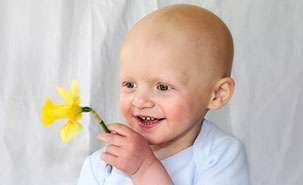New hope for the 20 percent of kids who don't respond to standard cancer treatment

A new drug combination being trialled in a groundbreaking CHU Sainte-Justine/University of Montreal study is giving hope for survival, healing and improved quality of life to the 20% of children who do not respond to standard cancer treatments. Known as DEC-GEN, it's the world's first study involving children with solid tumors or recurrent or refractory leukemia. It was designed at the CHU Sainte-Justine Research Centre by principal investigators Dr. Noël Raynal and Dr. Henrique Bittencourt, both professors at the University of Montreal, and aims to evaluate the effectiveness in children of a combination of two drugs which are already used individually in the treatment of cancers. This drug combination therapy developed at the Institut national de la recherche scientifique (INRS).
Funded by Gateway for Cancer Research and the in-kind contribution of Pharmascience and DSM Nutritional Products, who will be providing decitabine and genistein respectively at no charge for the duration of the study, the DEC-GEN study is being carried out in collaboration with the INRS. It's innovative approach lies in the epigenetic action created by combining two drugs, namely decitabine, used to treat acute leukemias, and genistein, a natural isoflavone found in soybeans. The two molecules act synergistically to reprogram cancer cells and stop their progression, specifically targeting epigenetic alterations such as DNA hypermethylation, responsible for repressing tumor suppressor genes.
"The DEC-GEN combination is significantly less toxic than conventional therapies, because the effective dose is minimized through the synergetic action of the two molecules," says Noël Raynal, drawing upon the preliminary results of a clinical trial that was conducted with patients with solid tumors at the Notre-Dame Hospital of the CHUM. This trial was undertaken on behalf of the INRS and with the close collaboration of Pharmascience and DSM Nutritional Products.
Phase I of the study will be conducted in the first year at CHU Sainte Justine with 12 patients aged 2 to 20 years who are facing a therapeutic dead end. The objective is to assess the impact of a dose-escalated treatment on biological factors, such as DNA methylation, and on pharmacokinetic and pharmacogenetic parameters. Once the optimal dose is identified, phase II of the study will be extended to other pediatric oncology centers in Canada. In total, the researchers aim to treat 24 patients in the course of this study.
In addition to achieving the obvious sought and expected clinical benefits for patients, the researchers are confident that their work will broaden the horizon of scientists in their quest for other combinations of epigenetic drugs to fight cancers.















